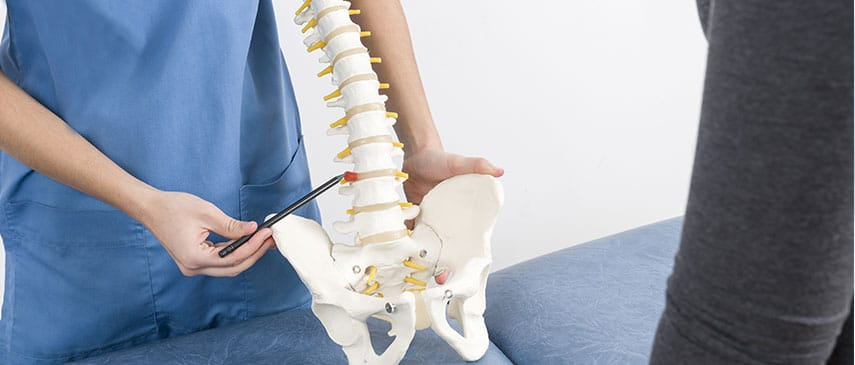Do you have pain in a particular part of your back, arm, or leg? Do you have symptoms like weakness, burning, tingling, numbness, or a cold water sensation running up or down your arm or leg? It may be a herniated disc in your back. Or it could be something else. How can you tell? To know for sure, it’s best to seek a professional opinion. Visit your doctor, an orthopedist, or a physical therapist for assessment.
Back pain is one of the most common reasons people seek physical therapy. As much as 80% of people will experience back pain of some sort during their lives. Herniated or bulging discs are often blamed for these symptoms.
What is a Herniated Disc?
Discs are the shock absorbers between the vertebrae in your spine. Their purpose is to provide stability, mobility, and support to your whole body. Each disc is like a jelly donut, with a jelly-like filling, or nucleus, surrounded by rings of connective tissue. Herniation is when these rings rupture or tear and the jelly starts to leak out of the disc. This can happen a number of different ways. Herniated discs can occur in all parts of the spine, but typically occur in the lower lumbar levels (L3, L4, L5, S1) or mid-cervical levels (C3, C4, C5, C6).
What Causes a Herniated Disc?
A herniated disc can be caused by a traumatic injury or repetitive micro-trauma. Some examples are:
- Repetitive twisting movements
- Heavy lifting, or lifting with poor body mechanics
- Bending your back while lifting
- Holding your breath
- Twisting while lifting
- Not using your core muscles
- Lifting something that’s too heavy
- Repetitive lifting
- Poor posture over time
- Poor ergonomics
- Sitting at a desk with head and shoulders hunched over
- Using electronic devices, phones, computers
- High-impact sports
- High Intensity Interval Training
- Weight-lifting
- Extreme sports
- Football or other contact sports
- Motor vehicle accident
- Falling from a height
- Catching a falling object
- Excessive body weight or obesity
- Anything that puts a force or shock through your spine
With a traumatic injury, or over time with repetitive straining and micro-tearing of the disc can tear or rupture, and fluid starts leaking out. When that jelly leaks out, where does it go? There are channels on each side of each vertebra where the nerves come out of the spinal cord. When a disc leaks, that fluid goes into these channels, putting pressure on the spinal cord and the nerve roots. Nerves don’t like being crowded, or contacting that fluid. Irritated or pinched nerves lead to symptoms that you feel.
What are the Symptoms of a Herniated Disc?
Symptoms of a herniated disc and irritated nerve root may include:
- Specific pain in the leg or arm, can be sharp and typically worse in the mornings
- Burning, numbness, or tingling in a specific part of an arm, hand, leg, or foot
- A cold water sensation flowing down your arm or leg
- Pain that intensifies when bending, lifting, twisting, sitting, coughing, or sneezing
- Difficulty with moving or bending in the mornings
- Weakness in the leg, foot, arm, or hand
- Generally one-sided pain
Why is it Worse in the Mornings?
When you lay down, your spine is no longer working to hold you up against gravity. The muscles in your back and core can rest. The discs essentially take a big breath and sigh in relief, as the pressure is taken off of them. While you are lying down, resting, or sleeping, the discs rehydrate—they fill up with water and fluid, puff up to their full size, and fill up the space between your vertebrae. That is why you are as much as ½ an inch taller first thing in the morning! Then, when you stand up, gravity puts all that pressure of supporting your body back on those discs. The discs get squished again, and if there’s a tear, or herniation, fresh jelly leaks out onto that nerve root and causes your symptoms.
What is Sciatica?
The sciatic nerve is the largest nerve in your body. It is made up of five nerves from your spinal cord: L4, L5, S1, S2, S3. These nerves come together in your low back, travel through your hip and buttocks, and go down your leg to power the muscles in your pelvis, legs, and feet. Sciatica is the collection of symptoms you feel when the sciatic nerve gets pinched or injured somewhere in your body. This could be by a herniated disc in your lumbar spine. It could also be a number of other things like arthritis, being pinched between two bones, a muscle spasm in your buttocks, a muscle imbalance or weakness, or anything that changes your biomechanics and irritates the nerve. Whatever the cause, physical therapy can help you manage and lessen your symptoms of sciatica.
If it’s Not a Herniated Disc, What Could it Be?
Like with Sciatica, anything that affects or irritates a spinal nerve can cause symptoms like those of a herniated disc. Some examples are:
- Sprain or strain: an injury to your back that causes inflammation and swelling in the tissue.
- Arthritis of the spine: changing the shape of the bone, narrowing the channels through which the nerves exit the spinal column.
- Age-related degeneration: as we age, tissues dry out, thin, contract, change shape, and stiffen.
- Weakness in your core or back muscles: it takes strong core muscles to hold your vertebrae apart and lift your body weight off the discs in your spine.
- Muscular imbalance: if one side or part of your body has muscles that are weaker, tighter, or shorter than the other, it can change your alignment, which irritates the nerves.
- A disease process: if there’s not an injury or musculoskeletal reason for your symptoms, a doctor can help you determine if you have an illness or disease that could cause this.
- Or something else! A physical therapist, orthopedist, or doctor can help you determine what’s causing your symptoms.
Do I Need and MRI? Do I Need Surgery?
Most herniated or bulging discs can be treated conservatively by physical therapy without ever needing surgery.
Did you know that more than half of people have a bulging or herniated disc in their back by middle age, and more than 75% of people have one by age 70. However, most people never have any symptoms! It’s possible to live a normal, pain-free, healthy, active life with a bulging or herniated disc in your back, and never even know it’s there!
Everyone wants an MRI, to know what’s wrong and if they need surgery. Insurance companies are often reluctant to pay for this expensive procedure. Here’s the not-so-secret secret: generally you don’t need surgery, and usually physical therapy works better than surgery in the long-term. Physical therapy treatment is based on what you tell to your therapist, and on what your therapist sees and feels when they evaluate you, not on an MRI report.
Research shows that people who get MRIs actually do worse than people who don’t, because they focus on the injury and what’s wrong in their back. People who don’t get the MRI and instead focus on what they can do, who work to strengthen their core and follow a physical therapy program, do much better in the long-term to recover from their back pain and stay healthy.
Your doctor, orthopedist, and physical therapist will work together with you to determine the best course of treatment for your symptoms.
What Can I Do?
Ask a physical therapist! In the state of Connecticut, you may see a physical therapist directly without having to go to a doctor first. Medicare and some insurance companies require a doctor’s prescription. You can see your primary care physician or an orthopedist and ask for a prescription for physical therapy.
Physical Therapists are movement experts. We will listen to your story, assess your symptoms, analyze your biomechanics, and how you move. We can figure out the root cause of your pain and help you treat it conservatively. We can help you restore proper posture, movement, balance, and strength. We can help you relieve your symptoms without medication, injections, or surgery.
At Carlson ProCare, our physical therapists will carefully evaluate you, help you determine what is causing or contributing to your symptoms, and work with you and your doctor to develop a comprehensive physical therapy program to help you achieve your goals.
Contact us to schedule your Physical Therapy appointment today!


